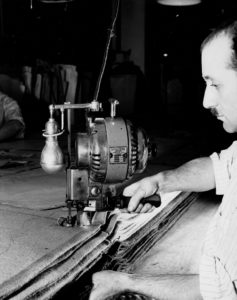My Grandpa’s Story
My Grandpa succeeded in business in 1917 the same way workers succeed at Facebook today in 2017.

Garment worker cutting fabric (International Ladies Garment Workers Union Photographs (1885-1985))
Grandpa Irving came to New York City from Russia at the age of 16. He couldn’t speak or read English, and he didn’t have a job. He got his first job through friends. They sent him to a textile company. The company hired him into no particular job. He was smart and a hard worker, so they moved him into different positions as they needed. The owners taught him the business by exposing him to all its facets. He saw how all the parts fit together: sales, production, finances. Eventually, he was promoted to run the company and had a successful career at it.
In the old days (and still in many small business around the world), this is how recruiting, retention, and development worked. You got a job based on who you knew. Then once there, you would learn the ropes. You would rotate around different areas of the company doing different things. Someone would hopefully take you under their wing. You would see what you liked and what you were good at and do more of that. You would grow and learn under the tutelage of the more experienced people.
What Is Old Is New Again
Strangely, 100 years later, Mark Zuckerberg does it the same way. Millennials today want the same kind of workplace as the millennials in 1917 (minus the safety and health hazards). Here are some of the similarities:
* At Facebook, and many large global technology companies today, if someone inside recommends you and you meet the general criteria for employees, you are interviewed and considered above the stacks of resumes. Why? You are a trusted part of the family, like in the old days. If a “family” member recommends someone, that person is automatically trusted as part of the family.
* When you get hired to Facebook as an engineer, you are not hired into a job. It’s like the old days. You hired into the company / family and find your way, mentored by the “elders” of the company.
* At Facebook today, you are expected to find a role that you find interesting and start working in that department. You don’t need permission to do the job, you just start doing it. You find your way. There is no clear career ladder. You hop from job to job based on talents and learning interests.
These strategies worked then and they work now. They are a great way to develop people – exposing them to various departments and functions – and a great way to keep millennials engaged and retained.
What Millennials Want Is Old Fashioned
What happened with Grandpa 100 years ago is what millennials want today. I am working on a project right now with a large global company looking improve their culture to create more millennial retention. In interviewing the millennials, I hear a desire to have things the way it used to be. They want the things that existed 100 years ago. These are some of the things you can do to create that old fashioned family atmosphere to attract and retain millennials:
Care about them like a professional family
In the “old” model, they cared about you enough to challenge you by giving you jobs you didn’t know how to do. They cared enough to talk to you about your ideas, even though you knew nothing about their business. They cared because you were part of the family.
Build trusting relationships
They trusted you enough to give you responsibility that was beyond your experience. If you had an idea you thought would work, they let you run with it. They wanted you to succeed and grow, so they let you experiment and make mistakes.
Mentor them
They want to someone looking out for them, teaching them, advising them, helping them advance in their knowledge and career. Like in the old days.
Demonstrate equality
They want to be included and involved in important decisions. I remember the time my father’s friend, the president of a garment business (surprise), took me around when I was 21 to meet his customers and explain to me how sales work (the most interesting approach was how he would challenge his customers to tennis and if he won, they would give him the business). This was all to teach me, even though I worked for him in another state in the manufacturing plant.
Does this all mean that the innovations in leadership, organization design, and HR policies of the past 100 years were wrong? Maybe partially. More to the point, it’s time to realize that everything old is new again. The old-fashioned methods of good leadership are what we need now for millennials at Facebook, in high tech, and everywhere. They want to be treated well, be given chances to grow, and be treated like they matter. If you do that, maybe in another 100 years their grandchildren will be telling stories of their success, and they will see how everything old is new again.
Note: Grandpa Irving did come from Eastern Europe, didn’t know English, did work in the garment business, and did eventually own and run his own successful company. However, the story I share here is a slight variation combining his story and that of my Great Uncle, Sam. Uncle Sam was shoveling snow in the garment district in the depression to feed his family and got a job at one of the textile companies. He worked his way up and eventually ran the company. Neither my Grandpa or Uncle Sam met Mark Zuckerberg. They were dead before Zuckerberg started Facebook. But their winning spirit lives on…




